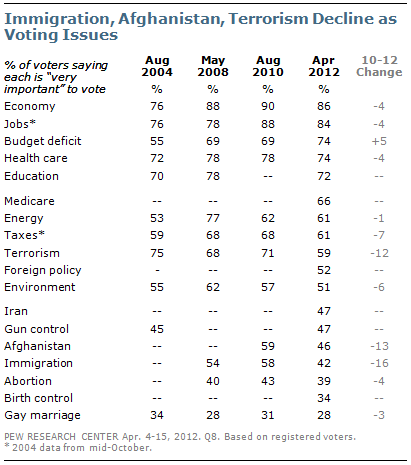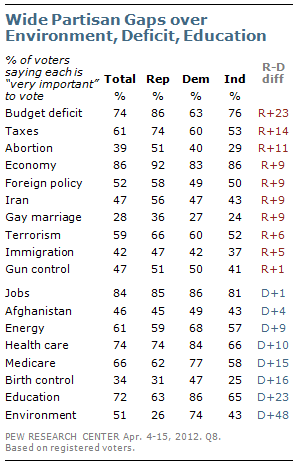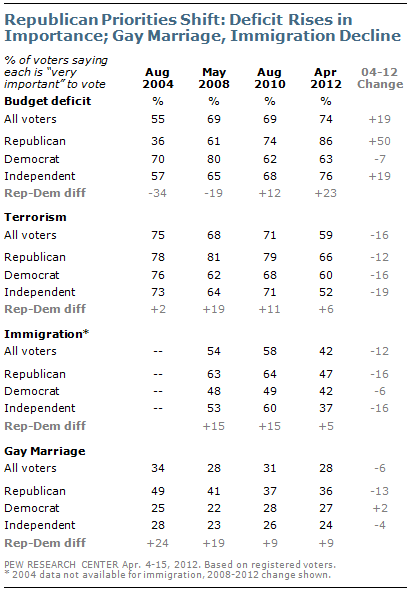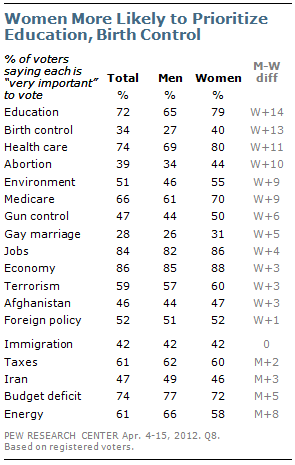
Fully 86% of registered voters say that the economy will be very important to their vote in the fall; 84% say that jobs will be very important. Both issues have ranked at or near the top of voters’ priorities in campaigns dating back to 2004.
The federal budget deficit is now viewed as more important than in the past. Nearly three-quarters of voters (74%) say the deficit will be very important, compared with 69% in 2010 and 2008, and just 55% in 2004.
By contrast, terrorism is viewed as much less important than during those campaigns. Currently, 59% say that terrorism will be very important to their vote, down from 71% in 2010 and 68% in 2008.
Immigration also has lost ground as a voting issue. Currently, 42% of voters rate immigration as very important, down 16 points since August 2010. Fewer voters also rate Afghanistan as very important today (46%) than did so during the midterm campaign two years ago (59% in August 2010).
As in recent campaigns, social issues rank relatively low in importance. About four-in-ten (39%) say that abortion will be very important to their vote, 34% rate birth control as very important, and just 28% say the same about gay marriage – the lowest percentage for any issue.
Dueling Partisan Agendas
Overwhelming percentages of Republicans, Democrats and independents rate the economy and jobs as very important voting issues. However, there are substantial partisan differences over the importance of other issues – including the environment, the

federal budget deficit, education, Medicare and birth control.
Nearly three-quarters of Democratic voters (74%) say that the environment will be very important to their vote this fall. Just 43% of independents and 26% of Republicans rate the environment as very important. The environment ranks near the top of the Democrats’ agenda; for Republicans, it ranks last among 18 issues tested.
Democratic voters also are more likely than Republicans to view education (by 23 points), birth control (16 points), Medicare (15 points) and health care (10 points) as very important issues.
By contrast, the federal budget deficit is viewed as very important by larger percentages of Republican (86%) and independent voters (76%), than Democrats (63%). Republicans also are more likely than Democrats to rate taxes (by 14 points) and abortion (11 points) as very important. There also is a modest gap over the economy, with 92% of GOP voters and 83% of Democrats rating it as very important.
The partisan differences in views of the importance of issues among voters are comparable to the gaps found among the general public in the Pew Research Center’s annual policy priorities survey, conducted in January.
Shifting Voter Concerns

In August 2004, just 36% of Republican voters rated the budget deficit as a very important issue to their vote. Among 11 issues tested, it ranked at the bottom, along with the environment (38%).
The percentage of GOP voters saying the deficit is very important increased 25 points between August 2004 and May 2008 – and has risen another 25 points since then (to 86%). In the current survey, only the economy ranks higher among Republican voters (92% very important).
The deficit rose in importance among Democrats from 2004 to 2008, before falling in 2010. Currently, 63% of Democrats say the budget deficit will be very important to their vote, which is largely unchanged from 2010 (62%), but down from 2008 (80%).
Immigration and gay marriage have slipped as voting priorities among Republican voters. About half of Republican voters (47%) say the issue of immigration will be very important to their vote; in 2010, 64% rated immigration as very important and in 2008 63% did so. Immigration also has fallen in importance among independents. Only about four-in-ten (37%) independent voters now view the issue as very important, down 23 points from August 2010. The percentage 0f GOP voters viewing gay marriage as very important has fallen 13 points, from 49% to 36%, since August 2004. There has been far less change in opinions among Democrats and independents, who have consistently rated this lower in importance than have Republicans.
Terrorism also has declined in importance as a voting issue, though in this case the change has occurred among Republicans, Democrats and independents. As recently as August 2010, 79% of Republicans and 71% of independents said the issue of terrorism would be very important to their vote in that fall’s midterm election. Today, 66% of Republicans and 52% of independents rate terrorism as very important. Democrats also view terrorism as somewhat less important than in previous campaigns (60% today, 68% in 2010).
Gender Gap in Issue Importance

There are several issues, including education, birth control, health care and abortion, that rate as more important for women than men. Nearly eight-in-ten women (79%) say that education will be very important to their vote this fall, compared with 65% of men.
Birth control ranks relatively low in importance among both female and male voters. Still, more women than men say birth control will be very important to their vote (40% vs. 27%). Among voters younger than 50, nearly twice as many women (46%) as men (25%) rate this as very important.
Women also are more likely than men to view health care (by 11 points), abortion (10 points), the environment (nine points) and Medicare (nine points) as very important voting issues.
Energy is the only issue that more men than women voters view as very important (66% vs. 58%). On most issues, including the economy, jobs, foreign policy and terrorism, there are no significant gender differences.